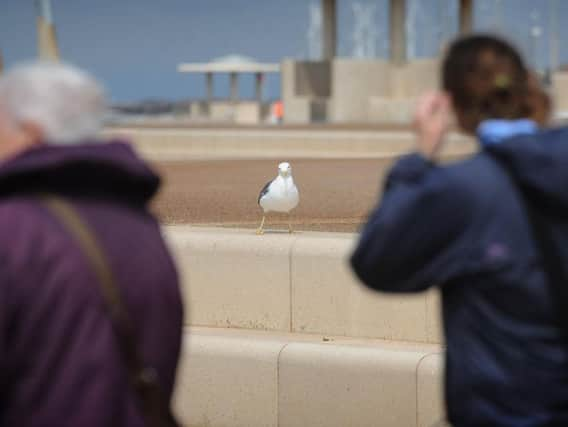Going to war with seagulls on a wing and a prayer?


Wyre Council is the first Fylde coast authority to float the idea of a ban on feeding seagulls – a deterrent, the council insists, to the growing problem of thefts and attacks from the skies.
The Council reported a 600 per cent increase in the number of attacks in five years, with 47 incidents reported since April this year.
Advertisement
Hide AdAdvertisement
Hide AdAuthorities across England and Wales are considering similar measures, since East Devon Council introduced fines in May.
But what difference have the measures on the south coast made, where £80 fines await anybody caught feeding a gull?
East Devon Council said it could not provide any figures for fines or prosecutions since the authority introduced Public Space Protection Orders in May.
But the council did explain how the controversial measures work.
Advertisement
Hide AdAdvertisement
Hide AdAnd fines aren’t the only weapon East Devon has used to battle the seagull blight.
A spokesman said: “All new litter bins in seaside towns have flaps across the apertures to prevent scavenging by gulls
“Posters requesting people not to feed the seagulls are displayed in seaside towns and have been distributed to local food businesses
“Advice is given to property owners on methods of protecting their own buildings and encouraging them to carry out egg replacement if possible.
Advertisement
Hide AdAdvertisement
Hide Ad“East Devon’s seaside towns have their refuse collected earlier during the summer which successfully reduces littering caused by seagulls.”
As in Wyre’s proposals the scale of enforcement isn’t made clear.
East Devon operates a system of on-the-spot fines and, as Wyre Council has suggested, has an online reporting system allowing persistent offenders and trouble spots to be identified.
But is it working?
The owner of Aby’s cafe, on the seafront in Exmouth was less than convinced. “I didn’t even know they did fines,” he said.
Advertisement
Hide AdAdvertisement
Hide Ad“If this was introduced in May nothing has changed, it’s as bad as ever.
“The gulls, they are not afraid, they are big and vicious, there’s no control.
“We have had to put up signs saying people eat at their own risk, before that we were refunding up to £100 for stolen food every day.”
Carol Burkett runs a cafe on the sea front in Budleigh Salterton, another Devon town under the gull menace.
Advertisement
Hide AdAdvertisement
Hide AdShe said: “I’ve never seen anyone enforcing this. I’d like to know how many people they’ve actually fined.
“You don’t even see a dog warden, never mind anyone dealing with this.
“I think there are more people getting upset about the welfare of seagulls than there are about people getting attacked.
“We’ve put flags up to deter them but they are a menace, they’ll take anything.”
Advertisement
Hide AdAdvertisement
Hide AdWhen the ban was introduced East Devon Council made it clear enforcement would not be heavy handed.
Coun Iain Chubb, who holds the environment portfolio at East Devon, described the new bylaws as a ‘final backstop’.
He said: “It’s one of those things where, if you’ve got somebody who is habitually feeding seagulls, it’s something to say you shouldn’t be doing this – there is a fine at the end of the day.
“There aren’t going to be police out looking for people throwing chips at birds, that’s for sure.”
Wyre’s consultation ends later this month.
Advertisement
Hide AdAdvertisement
Hide AdIf Wyre Council goes ahead with the Public Space Protection Orders they would be enforceable by both council officers and police with the public able to report problem spots.
The authority is hoping that the publicity surrounding the orders will help get the message out that feeding seagulls encourages them to try to take food contributing to an increase in attacks and, an increased level of water pollution caused by seagull poo.
The fines would be enforced in Cleveleys, Fleetwood and Knott End.